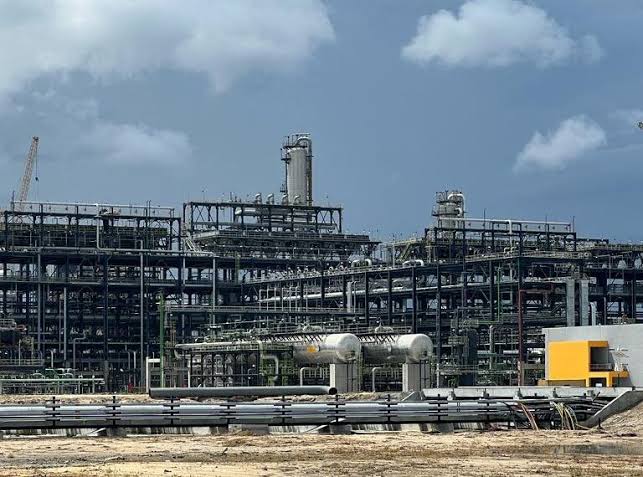Nigeria’s new Dangote petroleum refinery is Africa’s biggest – it will produce 650,000 barrels a day, giving it the potential to address the country’s energy supply crisis.
Owned by Nigerian industrialist and Africa’s richest man, Aliko Dangote, the refinery is expected to boost domestic refining capacity, getting rid of the current consumption shortfall.
Read Also: Buhari Confident Nigeria Will Thrive In Tinubu’s “Competent Hands”
In 2021, Nigeria spent US$11.3 billion on importing refined petroleum products. Nigeria subsidises the pump price of petrol.
This represents about 24% of Nigeria’s 2022 budget and is an unsustainable drag on public finances.
This money can now potentially be saved with Dangote refinery plugging the supply shortfall.
There is a link between Nigeria’s crude oil export dependency and its weak local refining capacity as well as the subsidy, and here are the reasons on how the economy will improve with the new Dangote Refinery.
Reduced oil import dependence
The most notable impact of Dangote refinery will be the increase in local refinery capacity, which will reduce imports.
Dangote refinery is expected to help Nigeria meet 100% of it’s refined petroleum product needs , with surplus products for the export market.
The refined petroleum output from the refinery in combination with other refineries in Nigeria is expected to meet the shortfall of the estimated daily consumption of 72 million litres of petrol.
https://twitter.com/DangoteGroup/status/1659932605167419393?t=2lMUwPc_0vAaglWxex_o9g&s=19
Refining crude oil locally will enable the country pay for the refined product in naira which will save scarce foreign exchange and generate revenue in exported refined petroleum products.
Support for allied industries
The establishment of the refinery is also likely to help reduce the cost of production for industries that rely on petroleum products such as diesel to power their operations.
While under construction, the refinery employed about 40,000 workers – 29,000 Nigerians and 11,000 foreigners. In full operation, the refinery, according to media reports, is expected to create over 250,000 direct and indirect jobs. The country’s current unemployment rate is expected to reach 40.6% in 2023.
Possible increase in carbon footprint
The operation of Dangote refinery raises concerns about its potential impact on Nigeria’s net zero emission goals. This is to protect Nigeria’s environment and ecosystem from the impact of climate change and reduce the country’s greenhouse gas emissions. Nigeria has an Energy Transition Plan to get closer to a more sustainable economy.
Conclusion
The Dangote refinery is a significant step towards self-sufficiency in Nigeria’s energy sector. However, the refinery is still reliant on fossil fuels, and it is not a long term solution to Nigeria’s energy needs. Nigeria has significant renewable energy potential, including solar and wind power. Renewable energy can be harnessed to meet Nigeria’s energy needs in a sustainable manner.

